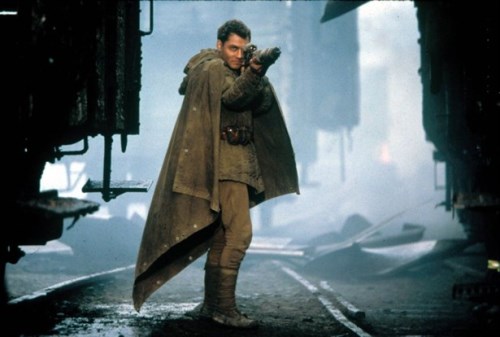War is hell and few moments in history personify this fact as well as the bloody Battle of Stalingrad. 2001's drama Enemy at the Gates relates the real life story of the Battle of Stalingrad and one of its most legendary heroes, sniper Vassili Zaitsev. At once a fascinating portrayal of one of the lesser known aspects of World War II and an exploration of the power of propaganda the film offers historical lessons that carry eerie relevance today. Step into one of the most harrowing chapters of modern history in Enemy at the Gates.
 |
| I've got my sights set on you |
The story begins in 1942 as Hitler's army advances towards Stalingrad. The film begins with a harrowing battle sequence that recalls the infamous Normandy landing in Saving Private Ryan before focusing in on real life Soviet sniper Vassisli Zaitsev. When commissar Danilov witnesses Vassili kill five German soldiers with ease he devises a propaganda campaign using Vassili's heroic image to boost Soviet morale. The publicity brings Vassili to the attention of the Germans and prompts the Third Reich to enlist their own top marksman, Major Erwin Konig, to kill the sharpshooter and end the propaganda surrounding him. The film then becomes a deadly game of cat and mouse with Vassili and Konig matching bullets and wits in equal measure. What follows is a fascinating exploration of the conflicts between government and country and truth and propaganda, set against the epic battle two men and the regimes that they serve.
The film stands out amongst countless other war dramas by depicting a battle on World War II's eastern front and highlighting the impact of state propaganda. While Hollywood typically focuses upon the war's impact in France, England, and Germany, Enemy at the Gates portrays the war's devastating impact upon the Soviet Union. In its portrayal of the Battle of Stalingrad the film offers a unique perspective on WWII and highlights the ways in which it pitted ideologies as well as nations and people against one another. Through its portrayal of the central duel between Vassili and Konig the film offers a more complex view of the war as its two central characters are forced to represent the equally abhorrent ideologies of communism and fascism. Through its portrayal of Soviet propaganda the film also highlights the ways in which our understanding of current and historical events are all too often shaped by crafted narratives. Donolov's propaganda portrays talented sniper and and apolitical Russian Vassili as a Soviet superman and symbol of communist might. While this depiction strays from the truth it serve's the regime's purpose of boosting Soviet morale and intimidating the enemy. Despite its strategic advantages, this narrative proves personally disastrous for Vassili as it places him personally under German scrutiny, putting him and everyone he cares for directly in harm's way. By showing the deadly consequences of Donolov's propaganda the film offers a scathing indictment of the ways in which government and media utilize propaganda to their advantage regardless of its impact upon everyday citizens. In this way, the film pits Vassili against two enemies as he struggles to survive his showdown with Konig while navigating the deadly channels of Soviet politics. As a result, he truly is a hero for our times as we ourselves are forced to navigate an increasingly uncertain economic and geopolitical future all while struggling in our own information war at home. For a war drama that is certain to satisfy history buffs and casual viewers alike step into battle with Vassili Zaitsev in Enemy at the Gates.
 |
| I always feel like somebody's watching me |
The film transports viewers to the bloody battle of Stalingrad thanks to the brilliant work of its cast. Bob Hoskins brings Soviet General and eventual Premier Nikita Kruschev to the screen in a bombastic performance that is nothing short of uncanny. Ron Perlman personifies grit as Vassili's world weary comrade, Koulikov. Gabriel Marshall Thomson's performance as Vassili's young neighbor, Sacha, belies his years in an unsentimental turn that captures the toll of war. Joseph Fiennes perfectly counters Law's boyish innocence in his cynical depiction of intellectual and propagandist Danilov. Rachel Weisz lights up the screen with a captivating combination of strength, intelligence, and charm as the object of both Danilov and Vassili's affections, Tania. Ed Harris blends cool professionalism with quiet menace to turn in a performance that is nothing short of chilling as Konig. Even in the midst of expert supporting performances the film belongs to Jude Law in one of the most mesmerizing performances of his career as reluctant hero Vassili.
In it's unflinching portrayal of World War II's Eastern front Enemy at the Gates provides viewers with one of the most original and engrossing films in the war drama genre. Through its expert blend of historical sweep and personal drama the film brings the Battle of Stalingrad to visceral life. The uniformly superb performances infuse the characters with humanity and lend the story a beating heart even at its most brutal. The film's depiction of characters over caricature ensures that it rises above the propaganda that surrounds its characters, which all too many war dramas are reduced to. For an explosively engaging view of World War II join the battle with Vassili, Tania, and Donolov in Enemy at the Gates.
 |
| Moscow girls make me sing and shout |

No comments:
Post a Comment